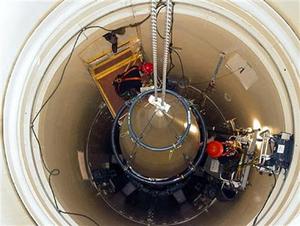Nuclear weaponsUSAF nuclear-missile officers alleged to have regularly cheated on readiness tests
Three former U.S. Air Force officers have alleged that USAF officers responsible for operating nuclear-armed missiles at Malmstrom Air Base in Montana have, for many years, been cheating on monthly readiness tests, and were never punished for it. The former officers claim that cheating is the norm and that officers who did otherwise are the exception.The officers who made the allegations added, though, that misconduct on tests did not impair the safety of the nuclear weapons or the Air Force’s ability to launch missiles if ordered.

Interior of nuclear missile silo // Source: af.mil
Three former U.S. Air Force officers have alleged that USAF officers responsible for operating nuclear-armed missiles at Malmstrom Air Base in Montana have, for many years, been cheating on monthly readiness tests, and were never punished for it..
The Los Angeles Times reports that the r revelations shed light on a cheating scandal involving thirty-four officers at the base who are under investigation for sharing details on exam questions and failing to report the misconduct. The scandal came to light when Air Force investigators were looking into drug possession charges involving two Malmstrom officers. Investigators came across text messages which suggested dozens of officers shared details about a test in September 2013. Air Force Secretary Deborah Lee James called the behavior “absolutely unacceptable.”
The former officers claim that cheating is the norm and that officers who did otherwise are the exception. “Everybody cheats on every test that they can, and they have for decades,” said one former officer who served at Malmstrom from 2006 to 2010, and said he had cheated on tests. “Maybe five percent [of the officers] don’t. But they know about it.”
Another former officer, Brian Weeden, who served on the base from 2001 to 2004, said that cheating is so common that commanders of launch teams would review officers’ exams for corrections before the exams were submitted. “I know a couple of commanders — and I did this a couple of times — who said before their deputy’s test was turned in, ‘Let me see it,’ and told them go back and look at a question that was answered incorrectly,” Weeden said.
Bruce Blair, a launch officer from 1970 to 1974and now a nuclear security expert and a research scholar at the Program on Science and Global Security at Princeton University’s Woodrow Wilson School of Public Information and International Affairs, toldthe Times, “there were hundreds of officers at my wing at Malmstrom, and I don’t think that I know anybody who didn’t cheat.”
Blair helped found the organization Global Zero, which seeks the elimination of nuclear weapons worldwide.
The tests measured the readiness of more than 500 launch officers, stationed at three different U.S. bases. whose task it securing and operating 450 Minuteman III intercontinental ballistic missiles (ICBMS) in the U.S. nuclear arsenal. Lieutenant General Stephen Wilson. Commander of the Air Force’s Global Strike Command, which oversees the missile force, refuted the allegations of widespread cheating. “The Air Force does not tolerate cheating, period,’’ he said in a statement. “It’s unacceptable. Most of our airmen believe in, abide by, and live our core values of integrity, service and excellence…When we know of those who don’t, it takes courage to speak out, step up and set the right example.”
The former officers said that cheating is unavoidable due to the “pressure-filled” life of a launch officer. The officers hope to trigger changes in the Air Force’s preparation and training requirements for nuclear war, an eventuality that now seems unlikely owing to the thawing in international relations since the end of the cold war. The officers also assured that misconduct on tests did not impair the safety of the nuclear weapons or the Air Force’s ability to launch missiles if ordered.
